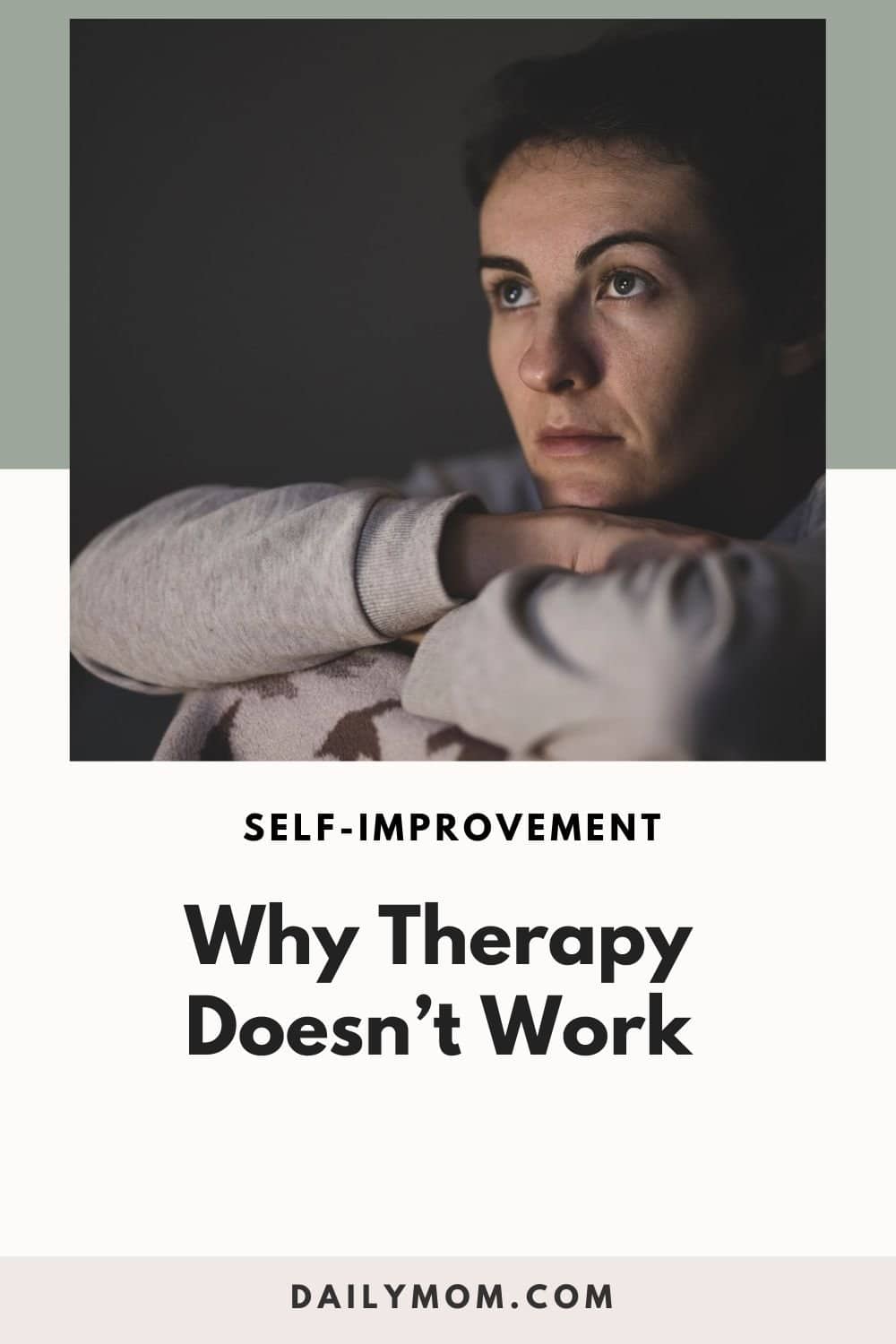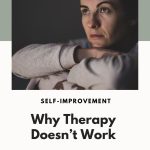In a world that often romanticizes the idea of therapy as a cure-all solution for life’s problems, it’s time to take a step back and question its effectiveness. Yes, we’ve all heard the success stories of individuals who credit therapy for transforming their lives. But what about those who have tried therapy, only to feel more frustrated and disillusioned? Is therapy the magic pill it’s made out to be, or is there a dark side that often goes unspoken? No matter how you feel about therapy, it is a well-known, never discussed fact that there are reasons why therapy doesn’t work.
While it’s important to acknowledge that therapy has undoubtedly helped countless individuals navigate their way through challenging times, it’s equally crucial to recognize that it’s not a one-size-fits-all solution. This is where the dark side of therapy begins to emerge – a side shrouded in unmet expectations, false promises, and the notion that therapy alone can heal all wounds. It’s time to start looking at why therapy doesn’t work.
The Myth of Therapy as a Cure-All Solution
This may come as a surprise to many. But therapy is not a cure-all for every mental health issue out there. There are many unacknowledged reasons why therapy doesn’t work and many people turn to therapy in the hopes of finding relief, understanding, and guidance. Yet, they have no knowledge about reasons therapy doesn’t work and therefore are not making informed decisions about their mental health. Therapy is not a magic fix for all problems. There are several reasons why therapy doesn’t work:
First, therapy is a highly individualized process. What works for one person may not work for another. This is because every individual is unique, with their own set of experiences, values, and beliefs. Individuals bring those qualities into the session. Therapists employ different therapeutic approaches, and finding the right approach that resonates with the client can take time and experimentation. It’s not uncommon for people to try multiple therapists or types of therapy before finding the right fit.
Secondly, therapy requires active participation and effort from the client. It is not simply a passive experience where the therapist does all the work. Clients must be willing to open up, be vulnerable, and actively engage in the therapeutic process. This can be challenging for some individuals who may struggle with trust, resistance, or a lack of motivation. If you aren’t ready to participate, therapy simply won’t work.
Another factor that can impact the success of therapy is the presence of underlying issues or conditions. Underlying conditions are a major reason why therapy doesn’t work because something else is needed to address complex mental health disorders or deeply rooted trauma. In such cases, additional interventions, such as medication or specialized treatment modalities, may be necessary. It’s important to recognize that therapy is just one component of a comprehensive mental health plan.
Furthermore, therapy is not a quick fix. It takes time and patience to see meaningful results and if you judge progress before that happens you may think therapy doesn’t work and give up prematurely. Progress in therapy often occurs gradually, with small steps forward and occasional setbacks. It’s essential for clients to have realistic expectations and understand that therapy is a process that requires commitment and perseverance.
Read More: What is Cognitive Behavioral Therapy
Unmet Expectations and False Promises
Despite the popularity and widespread use of therapy, many individuals find themselves experiencing unmet expectations and false promises. This phenomenon raises important questions about why therapy doesn’t work for everyone and whether the dark side of therapy exists.
One possible reason why therapy doesn’t work is that individuals may have unrealistic expectations in the first place. Therapy is not a magical cure-all that can instantly solve all of life’s problems. It takes time, effort, and commitment from both the therapist and the client to see results. However, some people may enter therapy with the belief that it will provide them with immediate relief and solutions to their problems. When therapy fails to meet these lofty expectations, disappointment and frustration can set in.
Another factor that can contribute to why therapy doesn’t work is the quality of the therapeutic relationship. The therapeutic relationship is built on trust, empathy, and understanding between the therapist and the client. If the client does not feel a genuine connection with their therapist or feels misunderstood, it can hinder the therapeutic process. Additionally, if the therapist lacks the necessary skills or expertise to address the client’s specific needs, progress will not happen. In fact, the client’s condition can worsen.
Additionally, external factors can influence the success of therapy and contributes to why therapy doesn’t work. For example, if an individual is dealing with ongoing stressors or a toxic environment outside of therapy, it can hinder their progress. It is essential to address these external factors and create a supportive environment that complements the therapeutic process.
Read More: Finding Inner Peace Through Art Journaling Therapy

Inherent Flaws within the Therapy System
There are several inherent flaws within the therapy system which is sometimes why therapy doesn’t work. The therapy system often places a heavy emphasis on diagnosis and pathology. While diagnosing mental health conditions can be important for providing appropriate treatment, it can also lead to a narrow focus on symptoms rather than addressing the underlying causes of distress. This can limit the potential for genuine healing and personal growth.
Another inherent flaw within the therapy system is the power dynamic between therapist and client. Therapists are often seen as the experts, possessing the knowledge and skills to guide their clients towards better mental health. This power dynamic can create a sense of dependency on the therapist, resulting in a passive role for the client and can be why therapy doesn’t work. This can hinder their ability to actively participate in their healing process and may perpetuate a reliance on therapy as the sole solution.
Furthermore, the therapy system is predominantly focused on short-term solutions. Many therapeutic approaches prioritize symptom management and quick fixes, often neglecting the long-term well-being of individuals. This can lead to temporary relief but may not address the root causes of emotional or psychological distress.
Finally, another inherent problem with therapy and why it doesn’t work is that there is a lack of research on some therapeutic approaches. Not every approach used by a therapist is based on evidence. It is guesswork sometimes for a therapist to know which approach is right for their client.
Therapy is Expensive
Sometimes therapy doesn’t work because it is too expensive. If you don’t have the money to see the sessions through to completion, it won’t work. Sometimes, even if you work within the financial constraints, the price of therapy alone makes it ineffective. Here are some reasons why a lack of money might make therapy less effective or seemingly inaccessible:
- Limited Options: You get what you pay for. If you can’t afford the best, just like anything in life, you don’t get the best. Individuals with financial constraints may have fewer options when choosing a therapist. They might be restricted to public or low-cost mental health services, which could have longer waiting lists or fewer available therapists.
- Frequency and Duration: Effective therapy often requires regular sessions over an extended period. Financial limitations might force individuals to reduce the frequency or prematurely terminate therapy, impacting its effectiveness.
- Stress and Distraction: Financial stress and worry can be significant sources of mental health issues. These concerns can interfere with an individual’s ability to fully engage in therapy and focus on their mental health. If the entire session you are concerned with the cost, then you are unable to focus on the real reason for the session.
Read More: 183 Daily Affirmations

Mismatched Therapist-Client Relationship
Sometimes the reality of why therapy doesn’t work is that the therapist doesn’t jive with the client. The compatibility between the therapist and the client is very important and can greatly impact the outcomes of therapy. If you don’t like your therapist, therapy isn’t going to work.
A competent therapist possesses a deep understanding of various therapeutic approaches and can tailor their approach to suit the specific needs of each client. They have the necessary skills to diagnose and understand clients’ problems accurately, enabling them to provide appropriate interventions.
By having a competent therapist, clients can feel confident that they are in capable hands. They can trust that their therapist has the necessary training and experience to guide them through their therapeutic journey. A competent therapist can help clients gain insights, develop coping strategies, and achieve their therapeutic goals.
However, competence alone is not enough to ensure a successful therapy experience and leads to why therapy doesn’t work. Compatibility between the therapist and the client is equally important. When there is a good fit between the client and the therapist, therapy becomes more effective and meaningful. But what happens if a competent therapist isn’t compatible with the client?
When there is a lack of compatibility, therapy may feel like a struggle. Clients may find it difficult to connect with the therapist, trust their judgment, or feel understood. This can hinder the progress of therapy and may lead to frustration and discontinuation of therapy. The client’s issues may also be out of the skillset that the client needs.
Read More: What is EDMR Therapy
Why Therapy Doesn’t Work: Too Much Emphasis on Feelings
Clearly, therapy focuses on how you feel. This is a major reason why therapy doesn’t work. The problem with this is that feelings are the most fleeting thing in the world. So in a process that prioritizes and focuses on feelings is doomed to fail in many scenarios. No one can be held responsible for your feelings, except for you. No one feels good all the time. Likewise, your feelings simply can’t be trusted to make long-term wise decisions. You need critical thinking skills to make solid long-term decisions.
Indeed, focusing and prioritizing solely on fleeting emotions can lead to several negative outcomes in your life:
- Inaccurate Decision-Making: Emotions are often fleeting and can change rapidly. Relying solely on these ever-changing feelings can lead to impulsive decision-making that may not align with one’s long-term goals or values.
- Limited Emotional Regulation: Constantly chasing or reacting to fleeting emotions can make it difficult to develop emotional regulation skills. It can lead to being overwhelmed by intense emotions and struggling to manage them effectively.
- Inconsistent Relationships: Focusing primarily on emotions can result in unstable relationships. When emotions constantly shift, it can be challenging to maintain healthy, consistent connections with others.
- Impulsive Behavior: Prioritizing emotions may encourage impulsive behavior. Individuals may act on the spur of the moment without considering the consequences or the impact on themselves and others.
- Short-Term Gratification: It often prioritizes short-term gratification over long-term well-being. What feels good at the moment may not necessarily be in one’s best interest in the long run.
- Difficulty in Achieving Goals: Long-term goals and aspirations may require perseverance and effort even when emotions are not favorable. Focusing solely on how one feels at a given moment can hinder progress toward these goals.
- Vulnerability to Manipulation: Individuals who are overly guided by their emotions can be more susceptible to manipulation by others who understand how to trigger or exploit those emotions.
- Lack of Resilience: Relying solely on emotions can make individuals less resilient in the face of adversity. They may struggle to cope with challenges when their emotional state is not positive
Alternative Paths to Personal Growth and Healing
Therapy isn’t the only option toward self-improvement. If you feel stuck and can’t figure out why therapy doesn’t work, change it up. Three options to start are journaling, meditation, or mindfulness exercises. Taking the time to pause and reflect on our thoughts, emotions, and experiences can provide valuable insights into our inner selves. By exploring our inner landscape, we can gain a deeper understanding of ourselves and our needs, paving the way for personal growth and healing.
Another alternative path is seeking support from a trusted community or social network. Sometimes, all we need is a listening ear or a supportive shoulder to lean on. Sharing our experiences, struggles, and triumphs with others who can relate can provide a sense of validation and belonging. This can be achieved through support groups, online communities, or even close friends and family members. Building strong connections and relationships can foster personal growth and healing in ways that traditional therapy might not.
Engaging in creative outlets can also serve as an alternative path to healing. Whether it’s painting, writing, dancing, or playing an instrument, creative expression can be a powerful tool for processing emotions and finding inner peace. Engaging in these activities allows us to tap into our subconscious mind, unlocking hidden aspects of ourselves and facilitating healing on a deeper level.
Finally, talking is sometimes just overrated. This is why my personal favorite way to self-improvement, is exercising. The natural mood boost from endorphins from movement is the best way to start feeling better. Essentially endorphins, “turn off your pain.” So for an immediate mood booster, get moving. For a long-term mood booster, make exercise a part of your daily routine. Because it’s hard to feel bad when you feel good.

Rethinking the Role of Therapy in Our Lives
It is crucial to remember that therapy can be highly effective when tailored to an individual’s specific needs and circumstances. There are many reasons why therapy doesn’t work but there are also many reasons why therapy does work. It remains a valuable resource for many individuals seeking support, personal growth, and healing. If someone is struggling with therapy, it is advisable to communicate openly with their therapist, explore alternative therapeutic approaches, or seek a second opinion to find a better-suited path toward mental and emotional well-being.
It is important to be aware of therapy’s flaws so you can make an informed decision about whether or not therapy is right for you. It is equally crucial to remember there are other options available to you. You should also be aware of your rights as a client, such as the right to confidentiality and the right to terminate therapy at any time.
WANT TO READ MORE?
How Stressed Parents Impact a Child
CONNECT WITH DAILY MOM
💖 NEWSLETTER: DAILY READS IN YOUR INBOX 💖
Sign up to receive our picks for the best things to do, see and buy so you can relax and focus on more important tasks! Let us help you be the best version of yourself you can be!
BE SOCIAL WITH US
📌 LOVE IT? PIN IT!📌
CONNECT WITH DAILY MOM
💖 NEWSLETTER: DAILY READS IN YOUR INBOX 💖
Sign up to receive our picks for the best things to do, see and buy so you can relax and focus on more important tasks! Let us help you be the best version of yourself you can be!
BE SOCIAL WITH US
📌 LOVE IT? PIN IT!📌










































